Key takeaways:
- Copyright automatically protects original works upon fixation, regardless of formal registration, highlighting the importance for both creators and consumers to understand their rights.
- In research, copyright not only safeguards original contributions but also promotes ethical practices and respect for intellectual property, essential for fostering collaboration.
- Documenting work meticulously and exploring copyright registration can significantly enhance protection against infringement, providing peace of mind for creators.
- Copyright infringement can lead to serious legal and emotional consequences, emphasizing the need for clear agreements and open dialogue within the academic community.
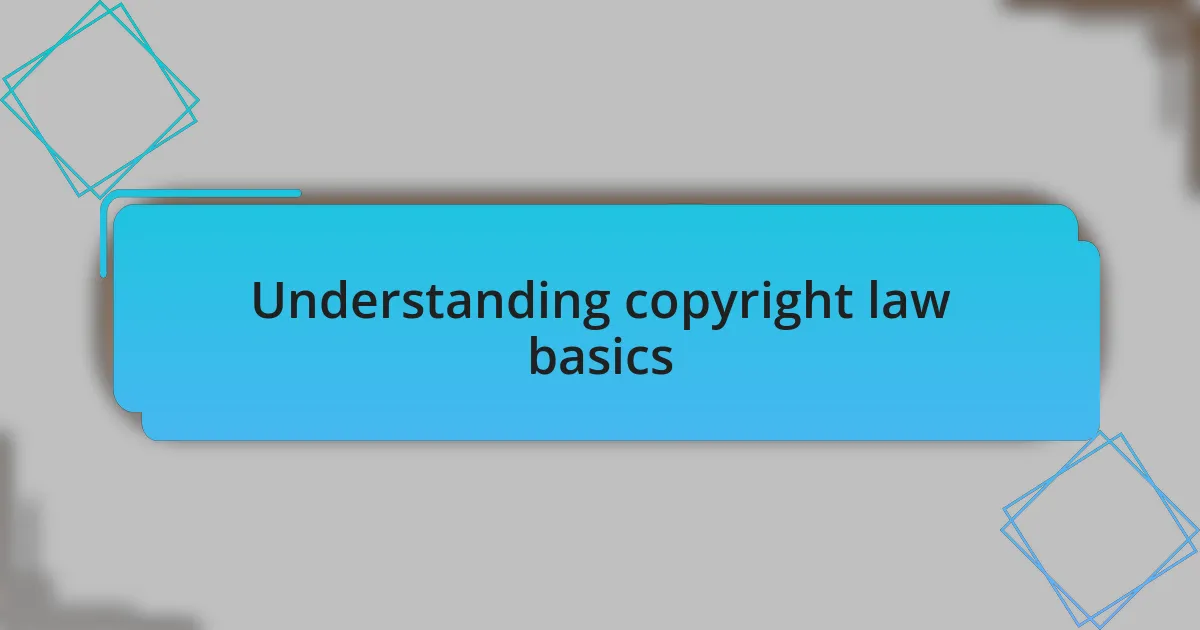
Understanding copyright law basics
Copyright law is fundamentally designed to protect the original expressions of ideas, granting creators exclusive rights to their works. Reflecting on my experiences, I recall a time when I created an article that gained traction online, only to find it appropriated by others without credit. It made me realize just how crucial understanding copyright law is—not just for creators but also for consumers who may unknowingly use copyrighted material.
One key point about copyright is that it automatically exists the moment an original work is fixed in a tangible medium. This means that even a simple blog post or a captivating photograph is protected without any formal registration. Isn’t it interesting how something as informal as a personal blog can carry legal weight? This realization really hit home for me when I noticed a friend’s artwork being used in a promotional campaign without his permission, emphasizing the need for vigilance.
Additionally, copyright laws vary significantly by jurisdiction, creating a complex landscape for anyone wanting to navigate this area. I’ve found myself often questioning: how do I ensure I’m not infringing on someone’s rights while trying to express my own ideas? Engaging with copyright literature and legal resources has been enlightening, helping me appreciate the depth of these laws and the balance they strive to maintain between protecting creators and fostering innovation.
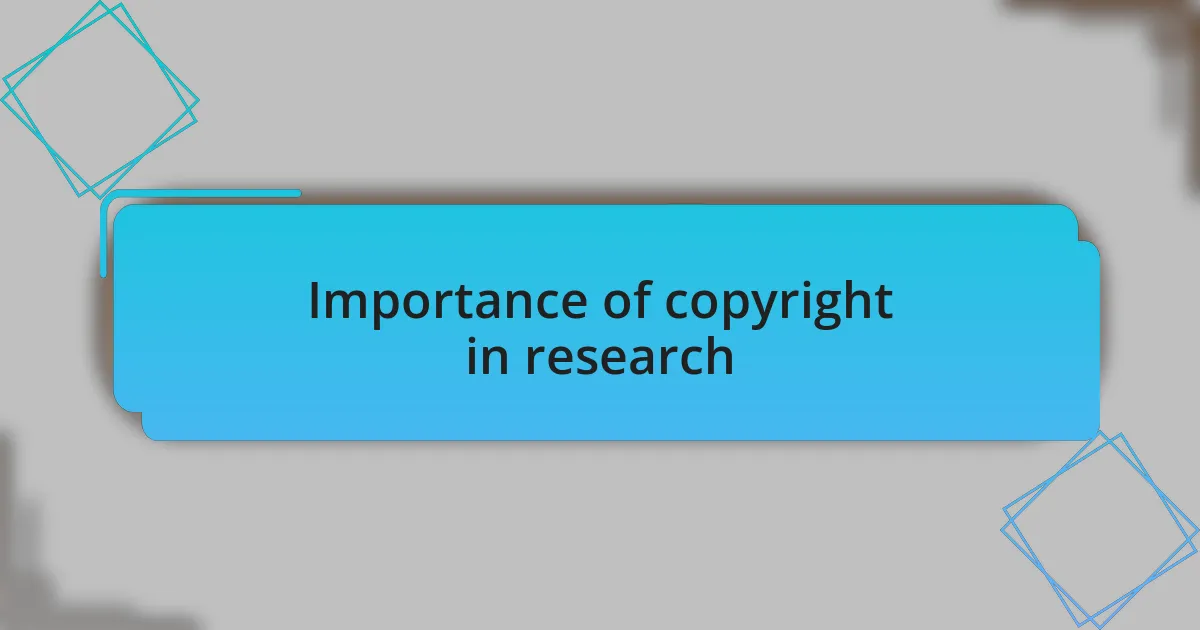
Importance of copyright in research
In research, copyright plays a crucial role in safeguarding the integrity of original work. I can vividly recall collaborating on a research paper where we had painstakingly gathered data over months; seeing that paper later cited without proper credit was incredibly disheartening. It made me realize how vital copyright is in not just protecting our contributions but also ensuring that future research builds on a foundation of respect and acknowledgment.
Another aspect of copyright that often goes unnoticed is its influence on the dissemination of knowledge. I’ve encountered researchers who, due to fears of copyright infringement, hesitated to share their findings with the broader community. Isn’t it ironic that the very laws meant to protect us can sometimes stifle the sharing of ideas? This experience pushed me to understand how important it is for researchers to navigate copyright thoughtfully, promoting both respect for original work and fostering collaboration.
Finally, copyright serves as a vehicle for ethical research practices, promoting transparency and trust within the academic community. I once attended a conference where a participant presented an impressive analysis of a controversial study, only to reveal, at the end, that he had rooted his insights in others’ work without proper citations. The collective gasp from the audience reinforced for me how vital it is to uphold copyright—after all, the credibility of research hinges not only on findings but also on respecting the intellectual property of others.
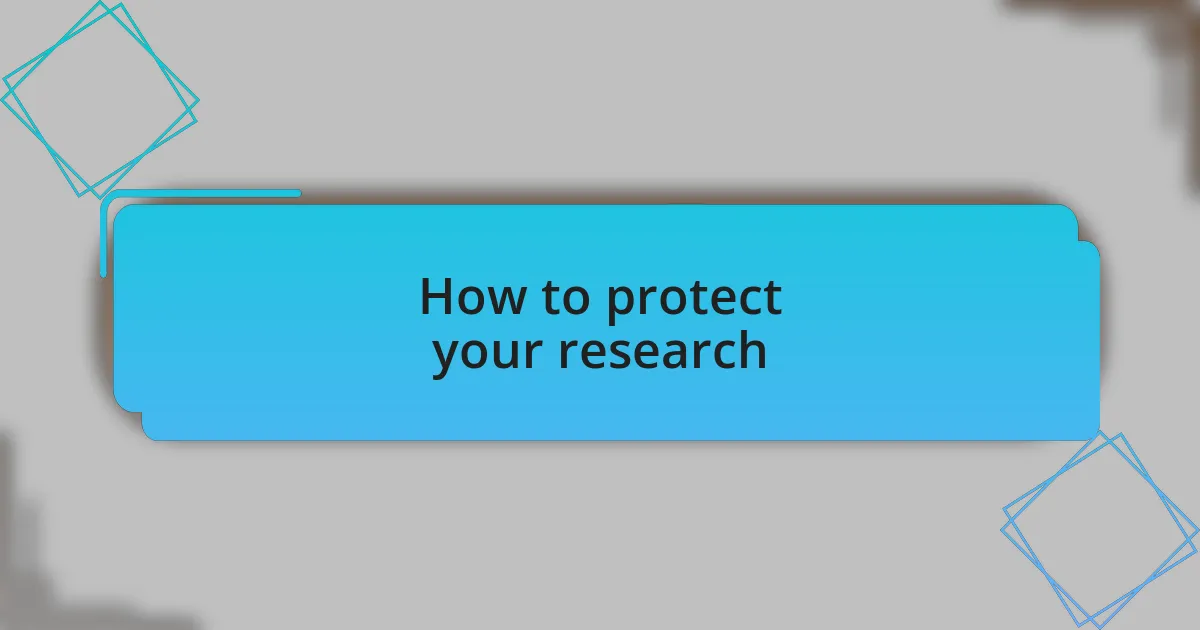
How to protect your research
To protect your research, one of the most effective strategies is to ensure that you document everything meticulously. I remember when I was in the early stages of a significant project, I created detailed notes, drafts, and timelines. This not only helped my workflow but also provided tangible evidence of my original ideas if any disputes ever arose. Have you considered how important it is to have that level of detail when safeguarding your intellectual contributions?
Another practical step in protecting your research is to utilize copyright registration. While copyright is automatically granted to the creator upon the completion of the work, registering it offers a layer of protection that can bolster your claims in any potential disputes. I once took that extra step for a pivotal piece of research, and honestly, it granted me peace of mind, knowing I had formal acknowledgment of my rights. It made me realize that in the world of research, a proactive approach can often be your best ally.
Lastly, consider employing open-access practices under a Creative Commons license. Sharing your work while still retaining copyright can foster a culture of collaboration, rather than fear. There was a time when I hesitated to share my findings for fear of misattribution, but once I began using these licenses, it felt liberating. Do you think the benefits of sharing your insights outweigh the risks of losing control over your work? In my experience, it truly does.
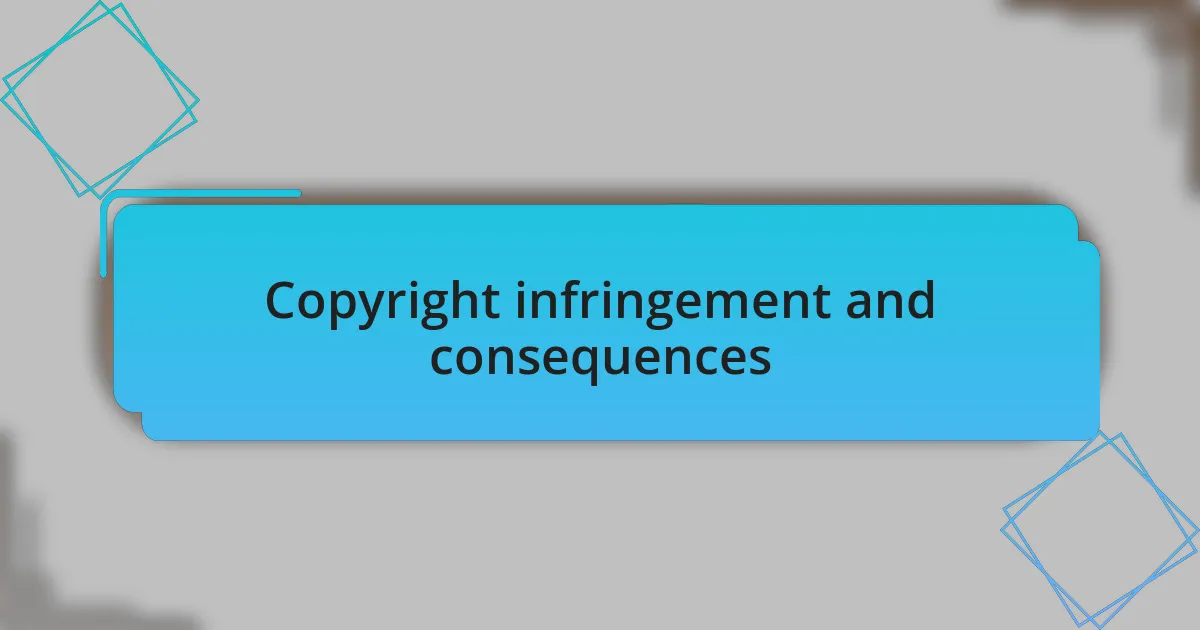
Copyright infringement and consequences
Copyright infringement occurs when someone uses your original work without permission, which can lead to various legal repercussions. I once had a colleague who faced the brunt of this after their research findings were published by another party without credit. It’s a concerning reminder that the consequences can be serious, including financial penalties and damage to one’s professional reputation. Have you ever witnessed a situation where someone’s hard work was unjustly exploited?
The repercussions for copyright infringement extend beyond just financial loss. In my experience, it can also lead to long, drawn-out legal battles that drain both time and energy. I remember reading about a researcher who spent years fighting for recognition and compensation, only to discover that the stress had taken a toll on their health. Isn’t it alarming to think that a simple act of misappropriation can disrupt not just careers but lives?
Moreover, copyright infringement can erode trust within the academic community. I’ve observed how a single incident can create a ripple effect, making others hesitant to share their work for fear of being taken advantage of. It begs the question: how can we foster an environment of mutual respect when the fear of infringement looms large? I’ve learned that promoting open dialogue about copyright, alongside robust protection measures, is crucial for innovation and collaboration.
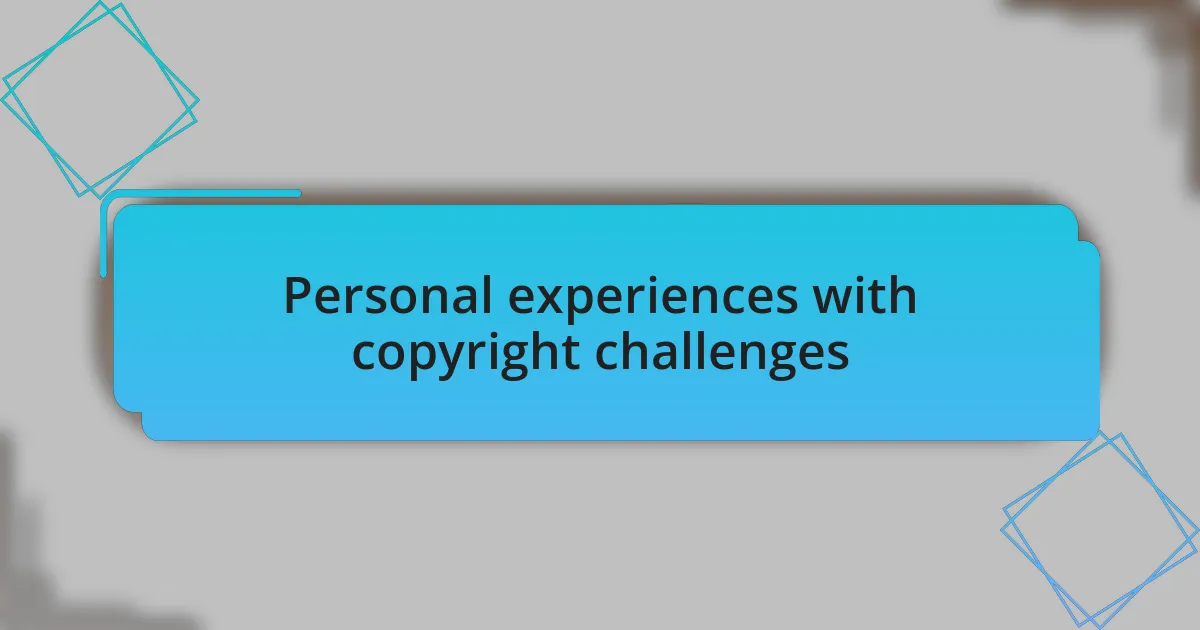
Personal experiences with copyright challenges
Navigating copyright challenges can feel daunting, especially when your hard work is at stake. I recall a project where I collaborated with a team to write a white paper. After sharing it in a conference, I found it being discussed online as if it were someone else’s original idea. The feeling of frustration was palpable—how could our insights be so easily stripped from us? It made me realize how vital it is to monitor and protect our creative outputs.
I’ve encountered situations where the stakes felt even higher. A mentor of mine had a groundbreaking study plagiarized by a well-known organization. I watched them grapple not just with the legal implications, but also with the emotional fallout. It was heartbreaking to see their dedication and passion undermined, leading them to question their contributions to the field. Have you ever watched someone’s spirit diminish due to a violation of their intellectual rights?
These experiences have taught me the importance of vigilance. I remember investing time in learning about copyright registration after witnessing the fallout of unauthorized use. It dawned on me that understanding copyright isn’t just about protecting our work—it’s about reclaiming our narrative in a field where integrity matters. How can we move forward without ensuring our voices are heard and respected?
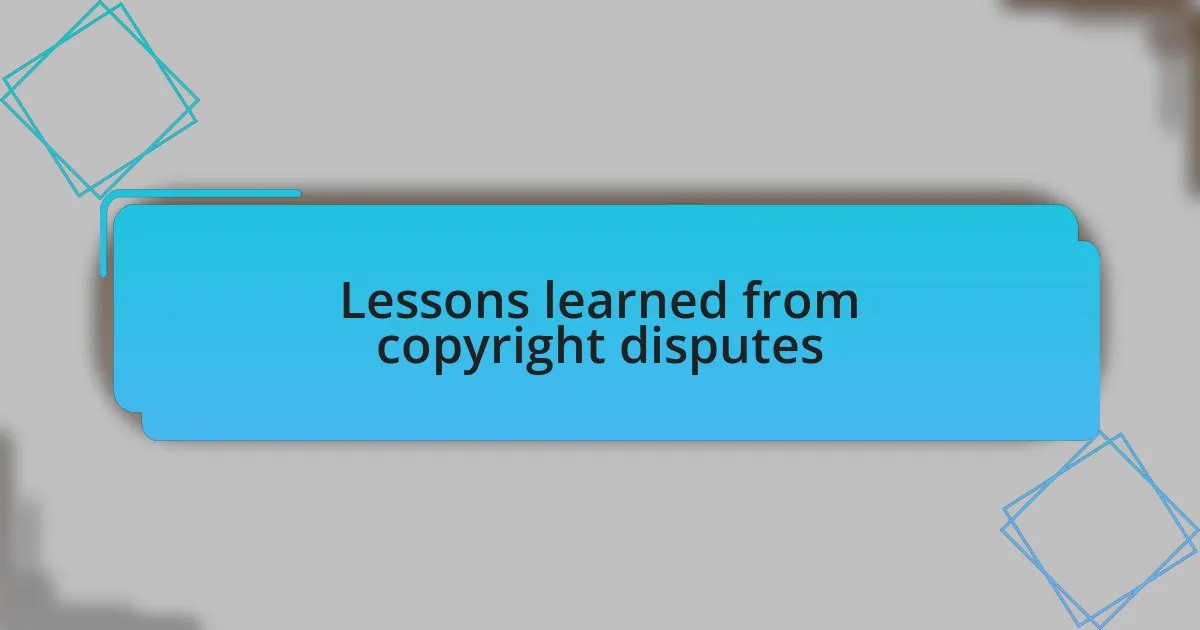
Lessons learned from copyright disputes
During my journey through various copyright disputes, I learned that clarity in ownership can save a lot of hassle. I once co-authored a report where the agreement was vague about who owned the ideas we generated. Later, I found one of my favorite sections being republished without acknowledgment. This situation highlighted the necessity of establishing clear agreements upfront—something I now prioritize to prevent misunderstandings.
One incident that stands out for me involved a colleague whose artwork was used in an advertising campaign without permission. The surprise and anger on their face were unforgettable. This experience reinforced the lesson that capturing evidence of creation—like timestamps and drafts—can be crucial. How often do we think about the tangible proof of our work? It truly is a safety net for us creators.
Reflecting on these experiences, it’s clear that copyright disputes can chip away at one’s motivation. I once attended a seminar where an expert spoke about the emotional toll these conflicts can take, and it resonated deeply with me. It’s vital to value not just our work but also our mental well-being amid such challenges. Shouldn’t we all strive to create a landscape where creativity thrives without fear of exploitation?